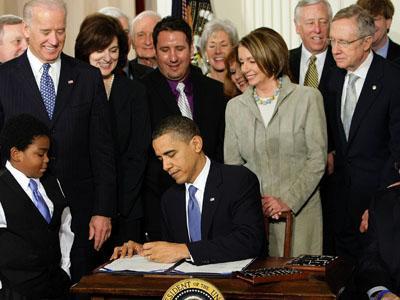America was divided Tuesday when President Obama signed the heavily debated health care reform bill into law.The bill is meant to expand health care coverage to millions of Americans and create an individual mandate on coverage. The bill’s passage is a victory for Obama, who has championed health care reform since his presidential campaign, said political science professor James Garand.”It’s a phenomenal landmark bill to pass,” Garand said. “It’s a very strong statement about Obama and his ability to get a key part of his legislative agenda through.” The House of Representatives passed the bill Sunday in a close vote of 219 to 212. All seven of Louisiana’s representatives voted against it, including Charles Melancon, the state’s sole Democratic representative.When the Senate passed the bill in December 2009, Sen. Mary Landrieu voted for the bill, and Sen. David Vitter voted against it.Some measures in the bill don’t take effect until 2014, but Garand said two parts will cause immediate changes — allowing young adults, including college students, to remain on their parents’ insurance policy until the age of 26 and preventing insurance companies from refusing service to people based on pre-existing conditions.College Democrats President Melanie Oubre said the extension for young people on their parents’ policy is important for students after graduation.Education junior JoAnna Cangelosi said the change is also good for students who aren’t able to graduate as quickly as others.”It’s beneficial because it’s taking so much longer to get out of school now,” Cangelosi said.College Republicans President Matthew Flynn said students won’t be happy about the bill when they get out of school and are taxed to cover the cost of public health care. “When they come out of college, if they’re making above $30,000 or $40,000 per year, they’re going to be paying for this, even if their companies offer a private health care plan,” he said. “They will be paying two health care bills out of college.”History junior Christy Davis said she is thankful for the change in policy for pre-existing conditions because her diabetes has caused problems with insurance.Davis said she was unable to get coverage for prescriptions for her diabetes when she switched from a job that didn’t offer insurance to one that did. The new job wouldn’t cover her pre-existing condition because she hadn’t been continuously covered for six months.She is now covered by a University insurance policy that covers $1,000 per year for her prescriptions, which she quickly spent with costs of $600 in medicine per month. She said she is grateful, but her policy isn’t ideal. “Bad insurance is better than no insurance,” Davis said. Graphic design sophomore Sam Gasc said he doesn’t like that the bill gives the government more say in citizens’ lives and choices.”It’s one thing to make it available, but it’s entirely another thing to force it on them,” Gasc said.Gasc said people make a choice for themselves whether to get insurance, and it’s not the government’s place to decide differently.The passage of the bill raises interesting questions about government’s role, Garand said.”I’m particularly interested in the health care debate relating to … the role of government and private individuals being responsible for their own lives versus government helping to facilitate their lives,” Garand said.Representatives from the Louisiana Democratic and Republican parties were unavailable for comment by press time, but Roger Villere, chairman of the Republican Party of Louisiana, released a statement Monday that derided Democratic leadership for creating legislation that would “put government bureaucrats in charge of decisions best made by patients and their doctor.”Garand said sentiments like this could make Democrats vulnerable to losing seats in upcoming elections.Oubre said she thinks the bill’s effects on elections will vary from state to state, and people may approve of the bill once they learn more about it.”Once people learn more about what was in the bill and stop paying attention to the ‘government takeover’ and those framing words that misguide people, they will be more apt to approve,” she said.Flynn said he thinks Democrats will be challenged in upcoming elections, not because of the health care bill itself, but because of its timing.”They took so much focus and energy on the bill, but they stopped focusing on putting people to work,” he said. “When people are becoming more unemployed than health care is rising, that should be the more prevalent issue.” Gov. Bobby Jindal announced Monday plans to raise a states’ rights argument in court against the bill. Jindal said it violates the 10th Amendment, which says powers not specified to either federal or state governments are granted to states.The claim would have to be reviewed against the commerce clause, which gives Congress the right to regulate commerce across state lines, said political communication professor Bob Mann.Mann said the legal validity of Jindal’s claim would have to be determined by the Supreme Court, but Republicans may be pleased with the mere discussion of it.”The opposition of the bill wants to keep people from focusing on what’s in the bill,” he said. “They want to maintain the anger and frustration that was there before the bill passed.”–Contact Ryan Buxton
Health care reform bill divides nation, campus
March 24, 2010





